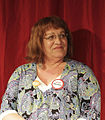
Back Portal:Transgender, Transsexualität und Geschlechtervielfalt German Portail:Transidentité French Portal:跨性别 Chinese
Welcome to the Transgender portal Being transgender is distinct from sexual orientation, and transgender people may identify as heterosexual (straight), homosexual (gay or lesbian), bisexual, asexual, or otherwise, or may decline to label their sexual orientation. The opposite of transgender is cisgender, which describes persons whose gender identity matches their assigned sex. Accurate statistics on the number of transgender people vary widely, in part due to different definitions of what constitutes being transgender. Some countries, such as Canada, collect census data on transgender people. Generally, fewer than 1% of the worldwide population are transgender, with figures ranging from <0.1% to 0.6%. Many transgender people experience gender dysphoria, and some seek medical treatments such as hormone replacement therapy, gender-affirming surgery, or psychotherapy. Not all transgender people desire these treatments, and some cannot undergo them for financial or medical reasons. The legal status of transgender people varies by jurisdiction. Many transgender people experience transphobia, or violence or discrimination towards transgender people, in the workplace, in accessing public accommodations, and in healthcare. In many places, they are not legally protected from discrimination. Several cultural events are held to celebrate the awareness of transgender people, including Transgender Day of Remembrance and International Transgender Day of Visibility, and the transgender flag is a common transgender pride symbol. (Full article...) Selected articleGender dysphoria in children, also known as gender identity disorder in children or gender incongruence of childhood, is a formal diagnosis used by psychologists and physicians to describe children who experience significant discontent (gender dysphoria) with their biological sex, assigned gender, or both. GIDC was formalized in the third revision of the Diagnostic and Statistical Manual of Mental Disorders (DSM-III) in 1980 and primarily referenced gender non-conforming behaviors. GIDC remained in the DSM from 1980 to 2013, when it was replaced with the diagnosis of "gender dysphoria" in the fifth revision (DSM-5), in an effort to diminish the stigma attached to gender variance while maintaining a diagnostic route to gender affirming medical interventions such as hormone therapy and surgery. Selected biographyGloria Hemingway (born Gregory Hancock Hemingway, November 12, 1931 – October 1, 2001) was an American physician and writer who was the third and youngest child of author Ernest Hemingway. Although she was born a male and lived most of her life publicly as a man, she struggled with her gender identity from a young age. In her 60s, she underwent gender transition surgery, and preferred the name Gloria when possible. A good athlete and a crack shot, Gloria longed to be a typical Hemingway hero and trained as a professional hunter in Africa, but her alcoholism prevented her from gaining a license, and it ultimately cost her her medical license in the United States. Gloria maintained a long-running feud with her father, stemming from a 1951 incident when her arrest for entering a bar in drag caused an argument between Ernest and Gloria's mother Pauline. Pauline died from a psychological stress-related condition the following day, which Ernest blamed on Gloria and Gloria later believed to have been caused by Ernest. Did you know (auto-generated) -
This month's birthdays
More did you know...
Random quoteBut if we cannot know what causes transsexuality, we can know a great deal about it. We can acknowledge its power and its reality, we can learn about other transsexual people and their experiences, and we can discover its ancient worldwide history. Related portalsSelected picturesTopics
CategoriesWikiProjects WikiProjects are non-hierarchical peer-run groups which serve as a resource for the communication on, and collaboration of, content within a specific topic area. Related WikiProjects: Things you can do
Associated WikimediaThe following Wikimedia Foundation sister projects provide more on this subject:
|
© MMXXIII Rich X Search. We shall prevail. All rights reserved. Rich X Search





























